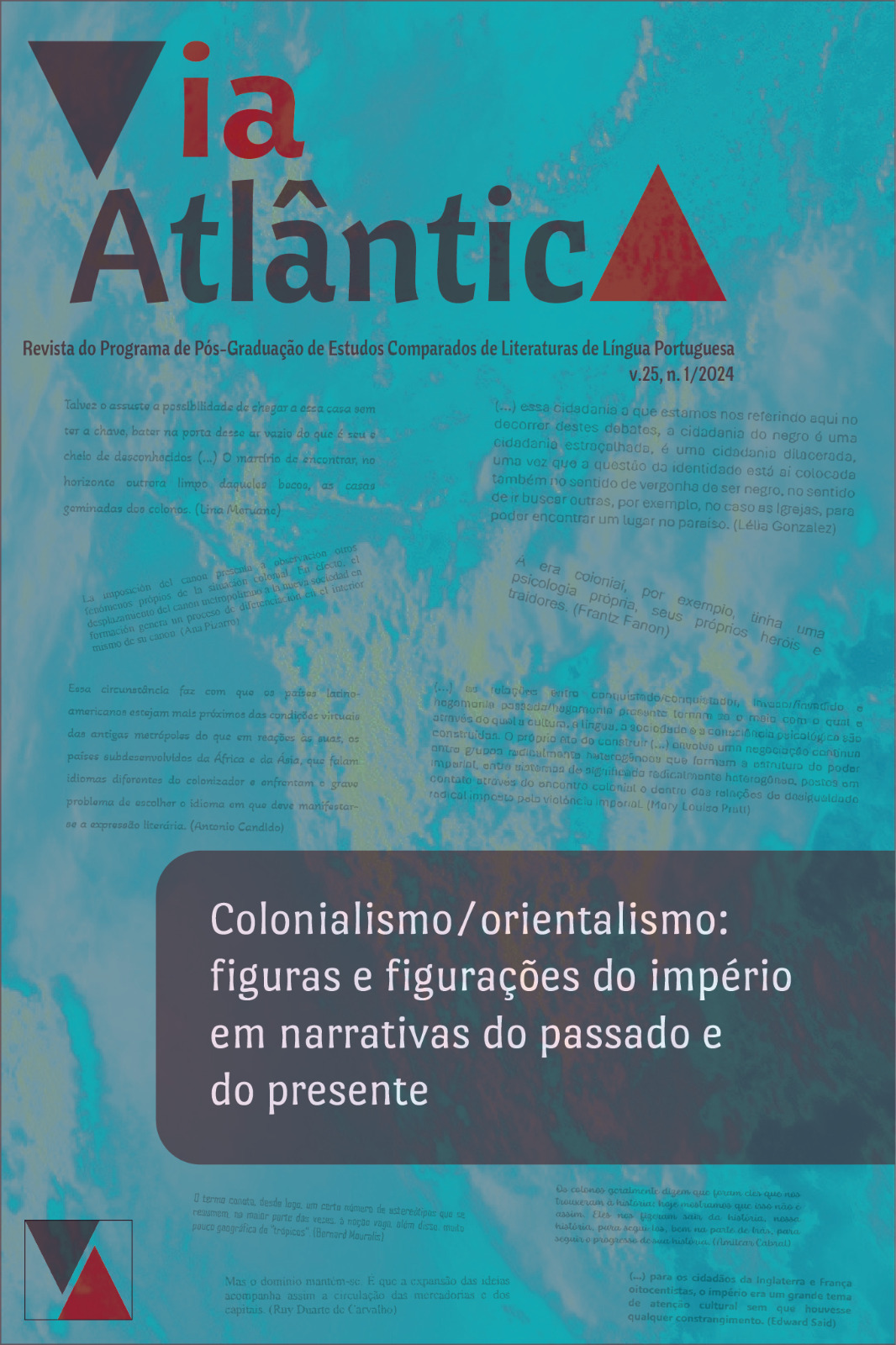Ruy Cinatti e a representação do "outro": ambiguidades e contradições
DOI:
https://doi.org/10.11606/va.i1.199660Palavras-chave:
colonialismo, identidade, alteridade, orientalismoResumo
O poeta, ensaísta e homem de ciência português Ruy Cinatti (1915-1986) desenvolveu atividade profissional como alto funcionário da administração colonial e, embora integrado na estrutura oficial do regime e subscrevendo a narrativa sobre a missão histórica de Portugal de civilizar e educar os povos indígenas dos territórios colonizados, desenvolveu, em paralelo, um fascínio pelas terras timorenses e pelas suas gentes. Cinatti defendia, ainda que dentro do quadro colonial, um desenvolvimento do território que favorecesse o crescimento dos timorenses sem ofender as suas tradições culturais. No presente ensaio, refletimos se Cinatti, ao inaugurar discursivamente uma nova relação de alteridade, não estaria, do ponto de vista epistemológico, antecipando as teses do orientalismo, doutrina que, nas décadas seguintes, afirmaria que a perceção do Oriente constitui uma imagem estereotipada do homem ocidental, construída para justificar uma alegada superioridade ética e civilizacional dos europeus e legitimar a dominação colonial.
Downloads
Referências
ANDERSON, Benedict. Imagined Communities. London: Verso, 1983.
BRAGA, Duarte Drumond. Os cadernos de campo de um etnopoeta: errância e registro nos poemas sobre Timor. Revista do Centro de Estudos Portugueses, Belo Horizonte, v. 35, n. 54, p. 11-20, 2015.
CAMÕES, Luís Vaz de. Os Lusíadas. [S. l.], 10 abr. 2016. Disponível em: https://oslusiadas.org/i/. Acesso em: 27 abr. 2023.
CASTELLS, Manuel. The Informational City: Information Technology, Economic Restructuring, and the Urban-Regional Process. Oxford: Basil Blackwell, 1989.
CINATTI, Ruy. Em favor dos timorenses. In: CINATTI, Ruy. Cidade nova. IV série, n. 5, 1956.
CINATTI, Ruy. Que os timorenses sepultem o meu corpo em Timor porquanto a alma já há muito lhes pertence. A Voz de Timor, Díli, 24 jun. 1972.
CINATTI, Ruy. Alguns aspectos de mudança social no Timor português. In: SOBRENOME, Nome (org.) . In memoriam, António Jorge Dias. Lisboa: Instituto de Alta Cultura; Junta de Investigações do Ultramar, 1974.
CINATTI, Ruy. Paisagens timorenses com vultos. Lisboa: Relógio D’Água, 1996.
CINATTI, Ruy. Um cancioneiro para Timor. Lisboa: Caminho,1996.
DEVI, Vimala; SEABRA, Manuel de. Literatura indo-portuguesa: antologia. Lisboa: Junta de Investigação do Ultramar, 1971.
ENNES, António. O trabalho dos indígenas e o crédito agrícola. In: Antologia colonial portuguesa, volume I, Política e administração. Lisboa: Agência Geral das Colónias, p. 23-55, 1946.
HALL, Stuart. A identidade cultural da pós-modernidade. Trad. de Tomaz Tadeu da Silva, Guacira Lopes Louro. 11. ed. Rio de Janeiro: DP&A, 2006.
MAALOUF, Amin. As identidades assassinas. Lisboa: Difel, 2002.
MATA, Inocência. Epistemologias do “colonial” e da descolonização linguística: uma reflexão a partir de África. Gragoatá, Niterói, v. 24, n. 48, p. 208-226, 2019.
MARY Louise Pratt: Indigenous people & the modernist myth of travel [CC]. Chicago: Chicago Humanities Festival, 10 mar. 2015. 1 vídeo (10 min 39 s). Publicado pelo canal Chicago Humanities Festival. Disponível em: https://www.youtube.com/watch?v=EyK_BO4m9mc&ab_channel=ChicagoHumanitiesFestival. Acesso em: 27 abr. 2023.
PINTO CORRÊA, Armando. Gentio de Timor. Lisboa: [s. n.], 1934.
PRAVEEN, Ambesange V. Postcolonialism: Edward Said and Gayatri Spivak. Research Journal of Recent Sciences, v. 5, n. 8, p. 47-50, 2016. Disponível em: http://www.isca.in/rjrs/archive/v5/i8/9.ISCA-RJRS-2016-051.php. Acesso em: 30 jun. 2022.
SAID, Edward. Narrative, Geography and Interpretation. New Left Review, London, v. 1, n. 180, p. 81-100, 1990.
SAID, Edward. Orientalismo. Lisboa: Cotovia, 2004.
SPIVAK, Gayatri Chakravorty. Can the Subaltern Speak?: Reflections on the History of an Idea. Org. de Rosalind Morris. New York: Columbia University Press, 1988. p. 24-28.
SPIVAK, Gayatri Chakravorty. The Post-Colonial Critic: Interviews, Strategies, Dialogues. Org. de Sarah Harasym. London: Routledge, 1990.
STILWELL, Peter. A condição humana em Ruy Cinatti. Lisboa: Presença, 1995.
TAYLOR, Charles. The Politics of Recognition. In: TAYLOR, Charles. Multiculturalism: Examining the Politics of Recognition. Princeton: Princeton University Press, 1994. p. 25-75.
THOMAZ, Luís Filipe. Timor Loro Sae: uma perspectiva histórica. In: Timor, um país para o século XXI. Lisboa: Instituto de Altos Estudos Militares; Universidade Católica Portuguesa, 2000.
WIEVIORKA, Michel. A diferença. Lisboa: Fenda, 2000.
Publicado
Edição
Seção
Licença
Direitos autorais (c) 2024 João Pedro Góis

Este trabalho está licenciado sob uma licença Creative Commons Attribution 4.0 International License.
Autores que publicam nesta revista concordam com os seguintes termos:
- Autores mantém os direitos autorais e concedem à revista o direito de primeira publicação, com o trabalho simultaneamente licenciado sob a Licença Creative Commons Attribution que permite o compartilhamento do trabalho com reconhecimento da autoria e publicação inicial nesta revista.
- Autores têm autorização para assumir contratos adicionais separadamente, para distribuição não-exclusiva da versão do trabalho publicada nesta revista (ex.: publicar em repositório institucional ou como capítulo de livro), com reconhecimento de autoria e publicação inicial nesta revista.
- Autores têm permissão e são estimulados a publicar e distribuir seu trabalho online (ex.: em repositórios institucionais ou na sua página pessoal) a qualquer ponto antes ou durante o processo editorial, já que isso pode gerar alterações produtivas, bem como aumentar o impacto e a citação do trabalho publicado (Veja O Efeito do Acesso Livre).
Dados de financiamento
-
Fundação para a Ciência e a Tecnologia
Números do Financiamento EXPL/LLTLES/1191/2021



















